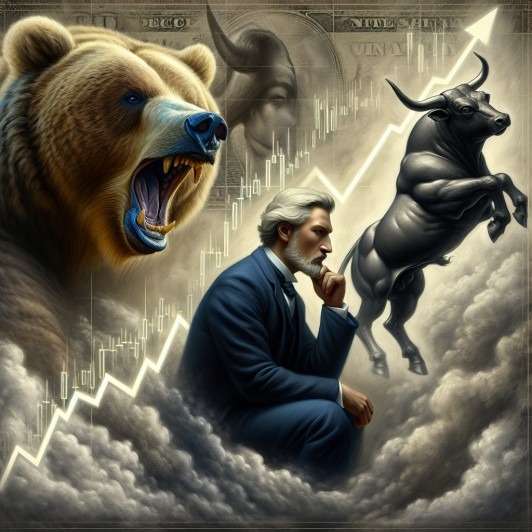Mar 14, 2024
Investment Mistakes: Flourishing Through Contrarian Choices
Introduction
“The individual investor should act consistently as an investor and not as a speculator.” – Benjamin Graham, legendary investor and author of “The Intelligent Investor”
In investing, following the crowd can often lead to costly mistakes. History has repeatedly shown that those who dare to think independently and go against the grain reap the most significant rewards. In this article, we will explore the wisdom of notable philosophers, investors, and even a financial engineer to understand how going against the crowd can help you thrive in your investment journey.
The Wisdom of The Ancients
“You have power over your mind – not outside events. Realize this, and you will find strength.” – Marcus Aurelius, Roman Emperor and Stoic philosopher.
The ancient Roman Emperor Marcus Aurelius understood the importance of self-control and rational thinking. Investing means not getting swept up in the emotional frenzy of market fluctuations. A recent study by Dalbar Inc. found that in 2020, the average investor underperformed the S&P 500 by 5.96%, mainly due to emotional decision-making and attempts to time the market.
The Contrarian Approach of Sir John Templeton
“To buy when others are despondently selling and to sell when others are avidly buying requires the greatest fortitude and pays the greatest ultimate rewards.” – Sir John Templeton, pioneering global investor.
Sir John Templeton, known for his contrarian approach, believed in going against the crowd. Despite widespread pessimism, he famously bought shares of every company trading below $1 on the New York and American stock exchanges on the eve of World War II. His investment turned $10,000 into $40,000 within four years.
The Psychology of Market Bubbles
“There is nothing so disturbing to one’s well-being and judgment as to see a friend get rich.” – Charles Kindleberger, economic historian.
Market bubbles are a classic example of the dangers of following the crowd. The dot-com bubble of the late 1990s and the housing bubble of the mid-2000s are prime examples. In both cases, investors got caught up in the euphoria and fear of missing out, leading to irrational exuberance and, ultimately, painful losses.
The work of Charles Mackay, a 19th-century Scottish journalist, sheds light on the psychology behind market bubbles. In his book “Extraordinary Popular Delusions and the Madness of Crowds,” Mackay examines the South Sea Bubble of 1720 and the Dutch Tulip Mania of the 1630s, demonstrating how mass psychology can lead to investment mistakes.
The Value of Independent Thinking
“The most important quality for an investor is temperament, not intellect.” – Warren Buffett, legendary investor and CEO of Berkshire Hathaway.
Warren Buffett, one of the most successful investors of all time, attributes his success to independent thinking and emotional discipline. He famously avoided the dot-com bubble of the late 1990s despite facing criticism for missing out on the tech boom. When the bubble burst, Buffett’s patience and discipline were vindicated.
The philosopher Immanuel Kant also emphasized the importance of independent thinking. In his essay “What is Enlightenment?” Kant argued that enlightenment is the courage to use one’s understanding without the guidance of others. Applied to investing, this means having the courage to make decisions based on your analysis and convictions, even if they go against the crowd.
A study by researchers at the University of Miami and Yale University found that hedge fund managers who exhibited independent thinking and resisted herding behaviour outperformed their peers by 4.4% annually.
The Dark Arts of Market Manipulation
“The stock market is a device for transferring money from the impatient to the patient.” – Warren Buffett.
While independent thinking and contrarian investing can lead to success, it’s essential to be aware of the dark arts of market manipulation. Throughout history, unscrupulous individuals have used various tactics to manipulate stock prices for their gain.
One such tactic is the “pump and dump” scheme, where manipulators artificially inflate the price of a stock through false and misleading positive statements, only to sell their shares at the inflated cost and leave other investors holding the bag. A recent example is the case of Jordan Belfort, the infamous “Wolf of Wall Street,” who pleaded guilty to stock market manipulation in 1999.
Another tactic is the “short and distort” scheme, where manipulators short a stock and then spread negative rumours to decrease prices. A high-profile example is the case of Herbalife, a multi-level marketing company targeted by hedge fund manager Bill Ackman in 2012. Ackman publicly accused the company of being a pyramid scheme and took a $1 billion short position. While Herbalife’s stock initially plummeted, it eventually recovered as the company fought against Ackman’s allegations.
The Importance of Patience
“The stock market is filled with individuals who know the price of everything, but the value of nothing.” – Phillip Fisher, pioneering growth investor.
Phillip Fisher, another legendary investor, emphasized the importance of patience in investing. He believed in thoroughly researching companies and investing in them long-term rather than trying to make a quick profit. Fisher’s approach has been validated by numerous studies showing that patient, long-term investors outperform those who try to time the market.
A study by Fidelity Investments found that the best-performing accounts were those of investors who had forgotten they even had an account or were deceased. These “ghost” accounts, free from the influence of emotional decision-making, outperformed the average investor by a significant margin.
The Stoic philosopher Epictetus also emphasized the importance of patience and long-term thinking. He taught us to focus on what is within our control and accept what is not. In the context of investing, this means focusing on thorough research and making sound decisions while accepting that short-term market fluctuations are beyond our control.
Conclusion
In conclusion, thriving as an investor often means going against the crowd. By learning from the wisdom of philosophers like Marcus Aurelius and Immanuel Kant, investors like Benjamin Graham, Sir John Templeton, and Warren Buffett, and even understanding the dark arts of market manipulation, you can cultivate independent thinking, emotional discipline, and patience needed to succeed in the long run.
Remember, the most important investment you can make is in yourself. By continually learning, staying informed, and developing the right mindset, you can navigate the complex world of investing and achieve your financial goals.
Exploring the Extraordinary: Must-Reads
Investment Journal: Charting the Course Toward Financial Triumph











